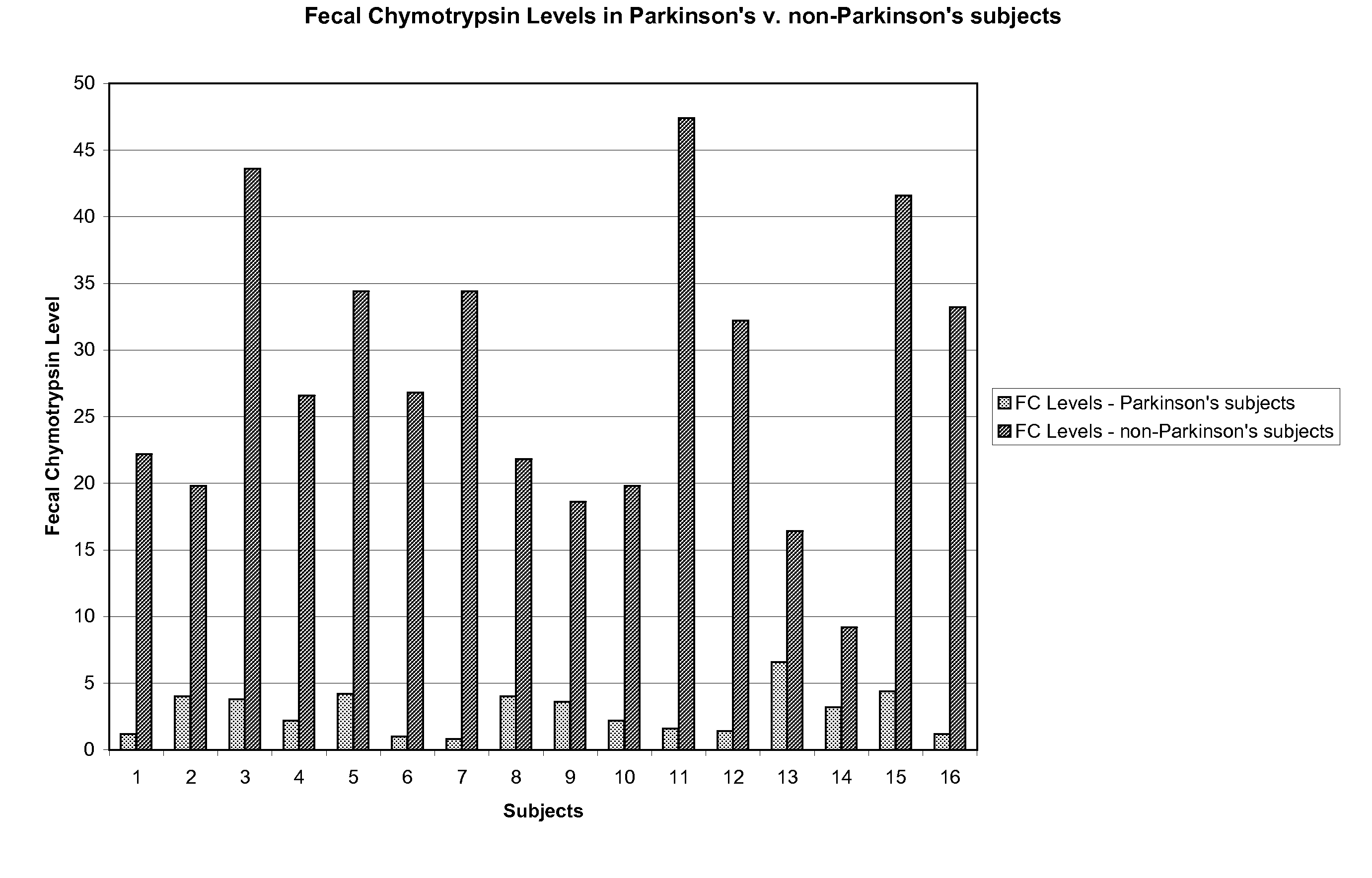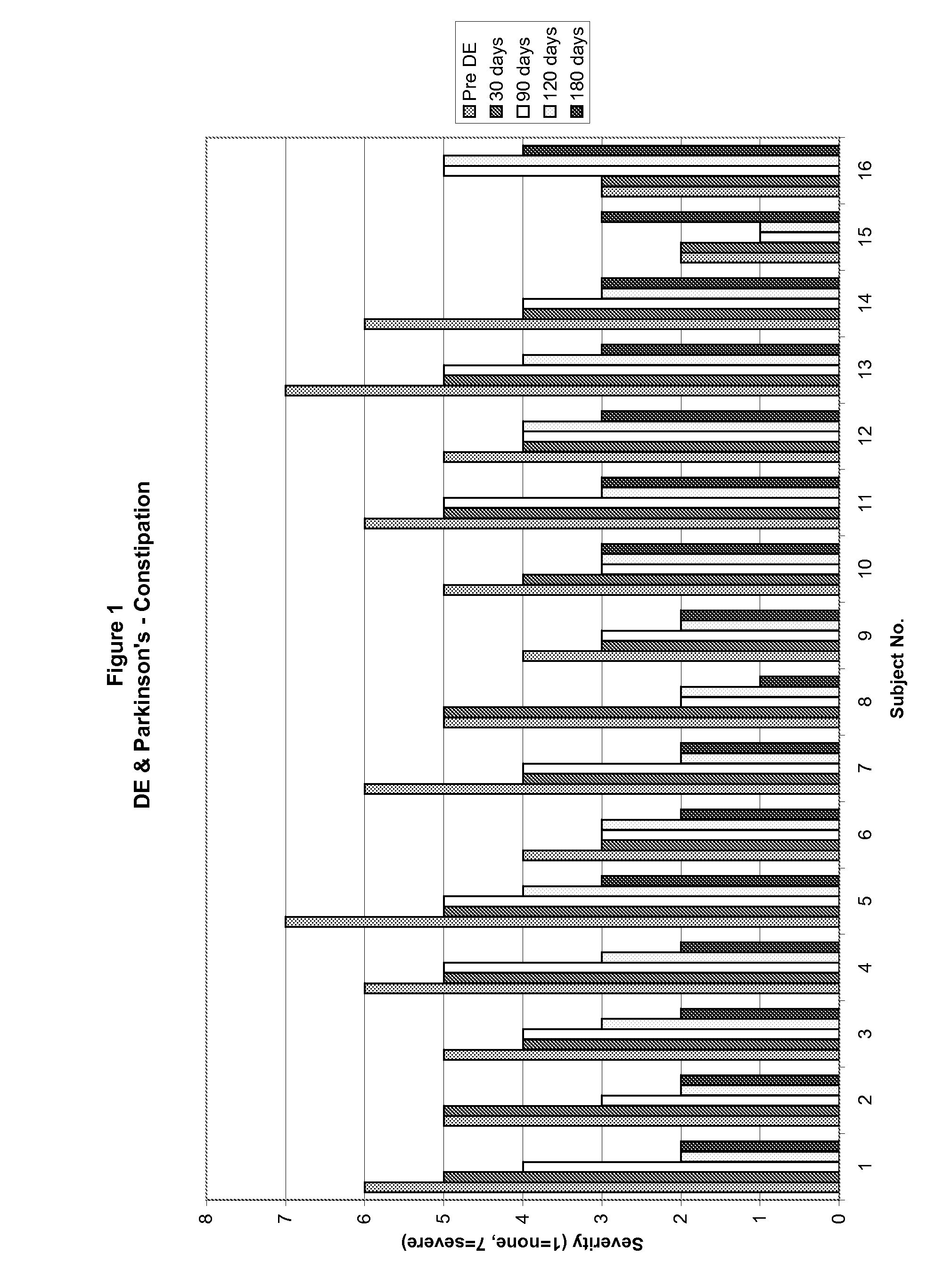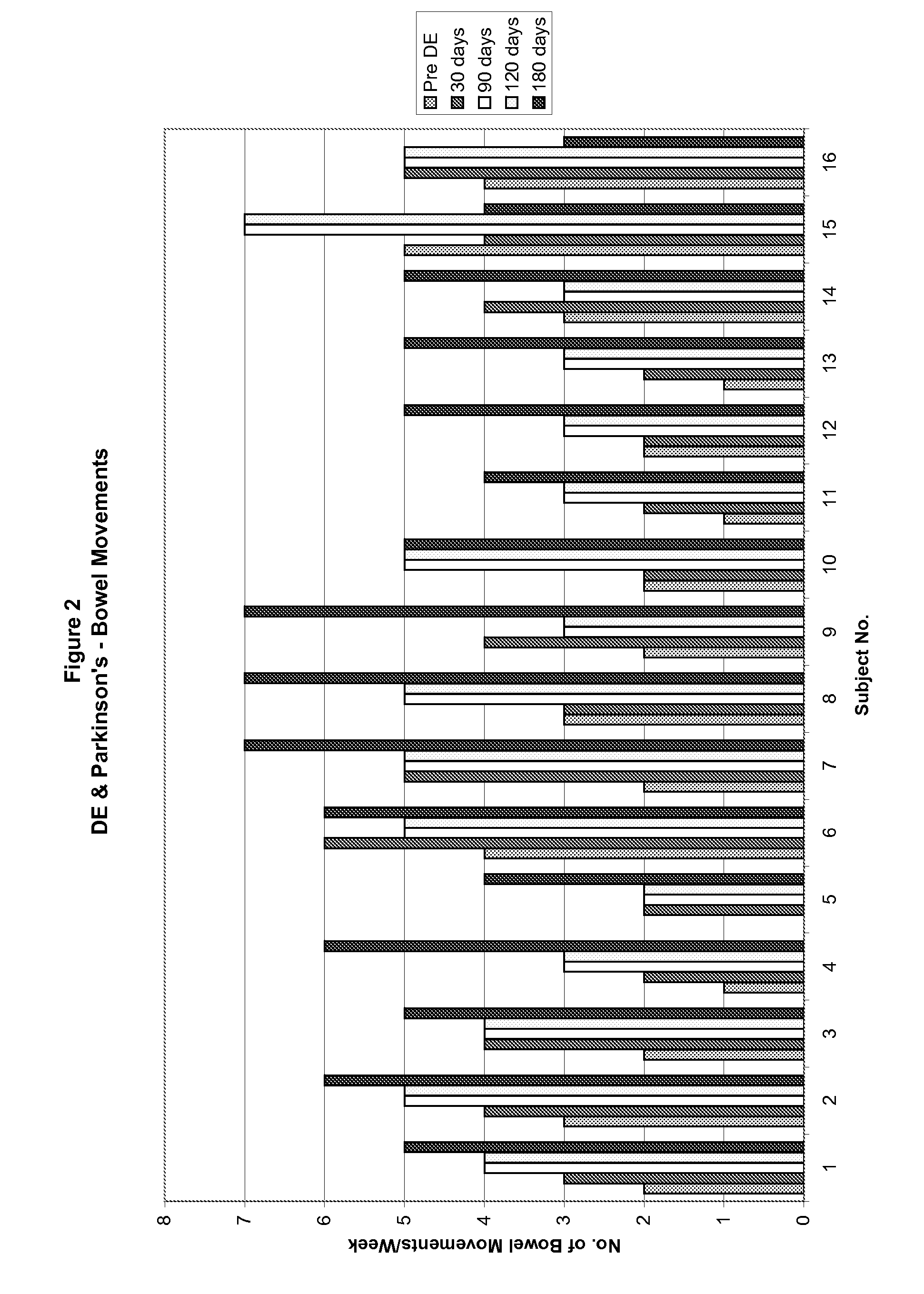Method of treating and diagnosing parkinsons disease and related dysautonomic disorders
a dysautonomic disorder and parkinson's disease technology, applied in the field of parkinson's disease and related dysautonomic disorders, can solve the problems of mental impairment in as many as 40% of parkinson's patients, lack of a substrate that would allow an injection form of levo-, and many normal and automatic functions of the body left with poor function or little to no function at all. , to achieve the effect of improving the symptom of the disorder
Inactive Publication Date: 2007-03-08
CUREMARK
View PDF99 Cites 105 Cited by
- Summary
- Abstract
- Description
- Claims
- Application Information
AI Technical Summary
Benefits of technology
[0025] In a further embodiment, a method for treating a Parkinson's patient with digestive / pancreatic enzymes involves administering an effective amount of digestive / pancreatic enzymes to an individual having the disorder in order to improve a symptom of the disorder.
Problems solved by technology
Hence in individuals afflicted with dysautonomias, many normal and automatic functions of the body are left with poor function or little to no function at all.
Additionally, changes in executive function are typically noted in a Parkinson's patient, often allowing the patient to appear as having Alzheimer's disease and resulting in misdiagnosis.
Further, the use of secretin directly as a therapeutic agent may be efficacious as in the case of those with familial dysautonomia.
These altered movements are features of the motor dysfunction, but in addition there can also be a mental impairment in as many as 40% of all Parkinson's patients.
To date, medical science has not found a substrate that would allow an injectable form of levo-dopa to reach the brain and successfully cross the blood brain barrier.
While the levo-dopa therapy can create some beneficial changes initially, those changes generally wane over time, and produce other problems such as severe sleep disturbance, dyskinesias, and constant nausea.
These interventions, however, are generally transient and neither produces a permanent change in the Parkinsonian state nor reverses the effects of the disease.
Abnormalities of the oxidative phosphorylation impair the mitochondria of the substantia nigra, and intensify free radical generation.
While the dyskinesias and loss of executive functioning of the brain receive the most significant mention with respect to Parkinson's disease, other physical manifestations exist that are associated with autonomic dysfunction which are often poorly understood.
Many studies have demonstrated the possibility that the large neutral amino acids (tryptophan, valine, isoleucine, leucine, tyrosine, phenylalanine) may interfere with the absorption of the 1-dopamine.
Method used
the structure of the environmentally friendly knitted fabric provided by the present invention; figure 2 Flow chart of the yarn wrapping machine for environmentally friendly knitted fabrics and storage devices; image 3 Is the parameter map of the yarn covering machine
View moreImage
Smart Image Click on the blue labels to locate them in the text.
Smart ImageViewing Examples
Examples
Experimental program
Comparison scheme
Effect test
example 1
[0040]
Amylase10,000-70,000USP units / mgProtease10,000-80,000USP units / mgLipase4,000-40,000USP units / mgPancreatin2,000-6,000USP units / mgChymotrypsin2-5mgTrypsin60-100mgPapain3,000-30,000USP units / mgPapaya30-500mg
example 3
[0042]
Amylase30,000USP units / mgProtease40,000USP units / mgLipase30,000USP units / mgChymotrypsin2-7mgPapaya30-500mg
the structure of the environmentally friendly knitted fabric provided by the present invention; figure 2 Flow chart of the yarn wrapping machine for environmentally friendly knitted fabrics and storage devices; image 3 Is the parameter map of the yarn covering machine
Login to View More PUM
| Property | Measurement | Unit |
|---|---|---|
| dysautonomic disorder | aaaaa | aaaaa |
| dyautonomic disorder | aaaaa | aaaaa |
| ph | aaaaa | aaaaa |
Login to View More
Abstract
A method for treating a Parkinson's patient with digestive / pancreatic enzymes involves administering an effective amount of digestive / pancreatic enzymes to an individual having the disorder in order to improve a symptom of the disorder. In addition, a method is provided for determining whether an individual has, or may develop, Parkinson's disease or related dysautonomic disorders and for determining whether an individual will benefit from the administration of pancreatic / digestive enzymes to treat the dysautonomic disorder.
Description
RELATED APPLICATIONS [0001] This application is a continuation-in-part of U.S. application Ser. No. 10 / 730,567, filed Dec. 8, 2003, which is a continuation of U.S. application Ser. No. 09 / 929,592 filed Aug. 14, 2001, which claims the benefit of U.S. Provisional Application No. 60 / 224,991, filed Aug. 14, 2000. Each of these applications is herein incorporated in its entirety by reference.FIELD OF THE INVENTION [0002] The present invention generally relates to a method for treating Parkinson's disease and related dysautonomic disorders and a method for diagnosing individuals with Parkinson's disease or related dysautonomic disorders. More particularly, the invention relates to a diagnosis method of analyzing a stool sample of an individual for the presence of a biological marker (or marker compound) that provides an indication of whether the individual has, or can develop, Parkinson's disease or a related dysautonomic disorder, as well as a therapeutic method for treating Parkinson's ...
Claims
the structure of the environmentally friendly knitted fabric provided by the present invention; figure 2 Flow chart of the yarn wrapping machine for environmentally friendly knitted fabrics and storage devices; image 3 Is the parameter map of the yarn covering machine
Login to View More Application Information
Patent Timeline
 Login to View More
Login to View More Patent Type & Authority Applications(United States)
IPC IPC(8): A61K38/54A61K9/48A61K9/50A61K9/16
CPCA23V2200/32C12Y304/22002A61K38/54A61K2300/00C12N9/94G01N30/00G01N33/52A61K38/465A61K38/47A61K38/4826A61K38/4873A23V2200/322C12Y304/21004C12Y304/21001C12Y304/00C12Y302/01C12Y301/01003A61P1/14A61P25/00
Inventor FALLON, JOAN M.
Owner CUREMARK
Features
- R&D
- Intellectual Property
- Life Sciences
- Materials
- Tech Scout
Why Patsnap Eureka
- Unparalleled Data Quality
- Higher Quality Content
- 60% Fewer Hallucinations
Social media
Patsnap Eureka Blog
Learn More Browse by: Latest US Patents, China's latest patents, Technical Efficacy Thesaurus, Application Domain, Technology Topic, Popular Technical Reports.
© 2025 PatSnap. All rights reserved.Legal|Privacy policy|Modern Slavery Act Transparency Statement|Sitemap|About US| Contact US: help@patsnap.com



